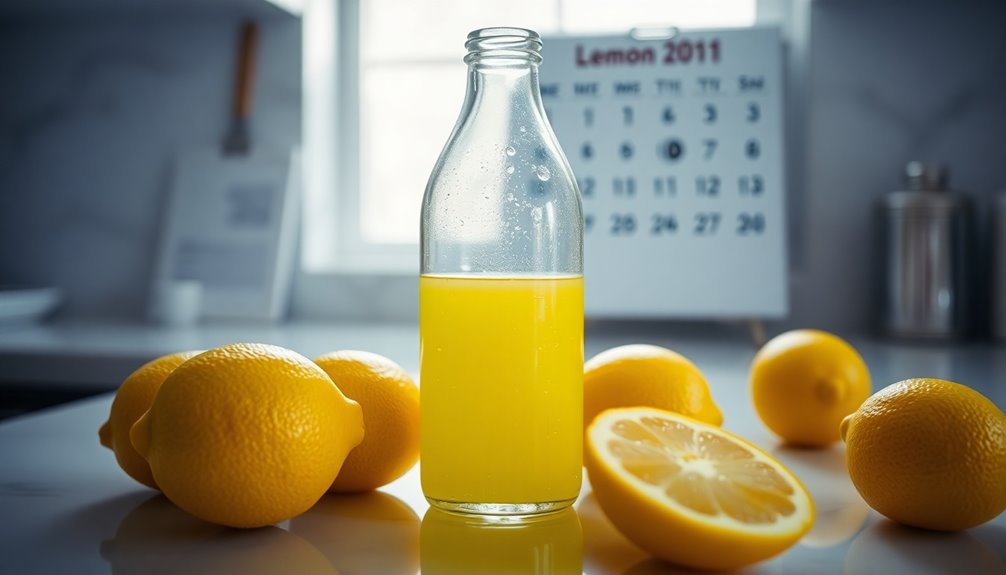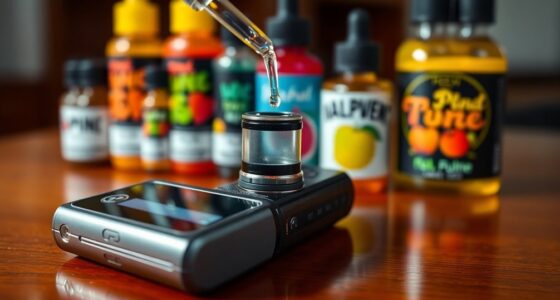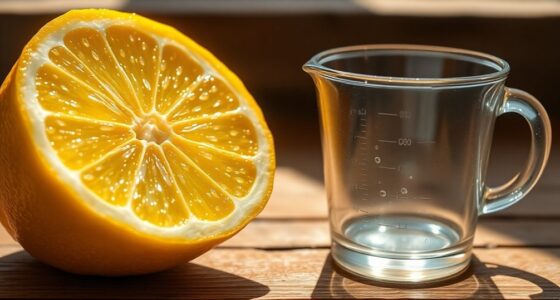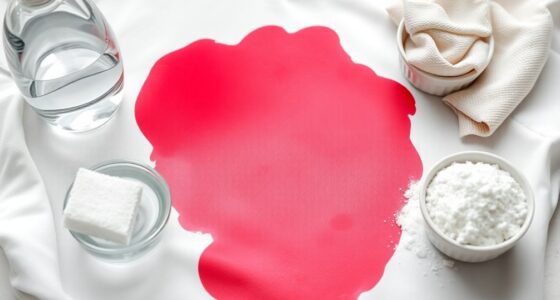Bottled lemon juice lasts about 12 to 18 months when unopened. Once you open a bottle, it should be refrigerated and can last up to 6 to 12 months. To maximize its shelf life, store it in a cool, dark place and seal the cap tightly after each use. Always check for off odors, unusual flavors, or visible mold before using. If you're curious about more storage tips and signs of spoilage, there's plenty more to discover.
Key Takeaways
- Unopened bottled lemon juice lasts 12 to 18 months when stored in a cool, dark pantry away from sunlight and heat.
- Opened bottles of lemon juice must be refrigerated and can last up to 6 to 12 months.
- The best-by date indicates optimal flavor but is not a strict safety deadline; quality may remain acceptable beyond this date.
- Signs of spoilage include off odors, unusual flavors, and visible mold; trust your senses for freshness evaluation.
- To extend freshness, freeze fresh lemon juice in ice cube trays and store in a freezer bag for future use.
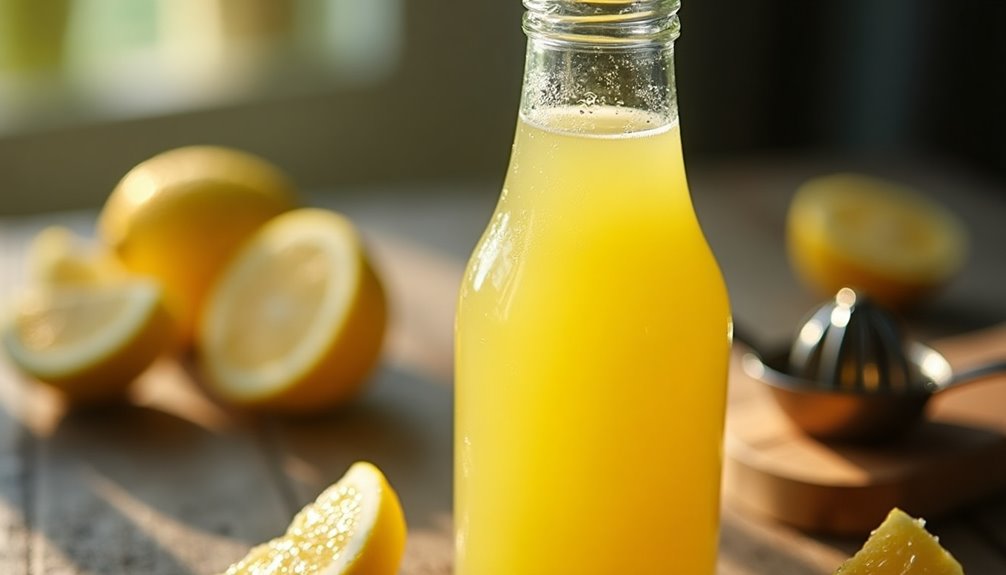
When you reach for that bottle of lemon juice, you might wonder just how long it'll last. Knowing the shelf life of bottled lemon juice can save you from unexpected surprises in your recipes. Unopened, a bottle of lemon juice can last between 12 to 18 months when stored in a cool, dark pantry. The key is to keep it away from direct sunlight or heat, which can affect its quality.
Once you’ve opened the bottle, things change a bit. You’ll need to refrigerate it, and if stored properly, it can last up to 6 to 12 months. The impressive shelf stability of bottled lemon juice comes from a combination of pasteurization and added preservatives, which allow it to remain safe to use even beyond its expiration date. To ensure you get the most out of your bottled lemon juice, keep it tightly sealed when not in use and avoid exposing it to direct sunlight. This will help maintain its flavor and nutritional integrity over time. Overall, understanding bottled lemon juice shelf life will allow you to enjoy its tangy goodness without any worries about spoilage.
You might notice that the best-by date is often just a guideline for optimal flavor and quality rather than a strict deadline. This means that as long as you keep an eye on the storage conditions, your bottled lemon juice can still be effective even after that date has passed.
After you open the bottle, immediate refrigeration is crucial. Proper sealing after each use helps maximize the shelf life of your lemon juice. Make sure to tighten the cap securely and put it back in the fridge right away. This practice prevents exposure to air and temperature fluctuations, which can lead to spoilage faster than you'd like.
Speaking of spoilage, it's essential to know the signs that your lemon juice may have gone bad. Off odors, unusual flavors, or visible mold are clear indicators that your lemon juice should be discarded. If you ever find yourself questioning the freshness of your juice, trust your senses. If it smells or tastes off, it's better to err on the side of caution.
If you find that you prefer the taste of fresh lemon juice and want it to last longer, consider freezing it in ice cube trays. Once frozen, you can transfer the cubes to a freezer bag, allowing you to use just what you need without the worry of spoilage. This way, you can enjoy the bright, zesty flavor of fresh lemon juice whenever you want.
Ultimately, understanding how to store your lemon juice properly can greatly extend its life. Whether you choose bottled or fresh, being mindful of storage conditions and recognizing the signs of spoilage are key to enjoying this versatile ingredient.
Frequently Asked Questions
Does Bottled Real Lemon Juice Go Bad?
Yes, bottled real lemon juice can go bad.
You should always check for signs of spoilage, like off odors, unusual flavors, or mold. If you notice any of these, it's best to toss it out.
Unopened, it can last a while, but once you've opened it, refrigerate it immediately.
Even then, it may lose flavor over time. Proper storage helps maintain its quality and safety for longer.
Can Expired Lemon Juice Be Used?
Expired lemon juice might seem risky, but it can actually be safe if stored correctly.
If you've got an unopened bottle, it could still be good for 12-18 months past the "Best By" date.
Once opened, you should ideally use it within 6-12 months, but don't toss it out just yet.
Just check for any off odors or unusual appearance.
Trust your senses; they'll guide you in deciding whether it's still usable.
Is Bottled Lemon Juice as Good as Fresh Lemon Juice?
When you're comparing bottled lemon juice to fresh lemon juice, it really depends on what you need.
Bottled juice offers convenience and a longer shelf life, but it might lack the vibrant aroma and taste of fresh juice. If you're after consistent acidity for cooking, bottled juice works well.
However, for fresh, bright dishes, nothing beats the flavor of freshly squeezed lemons.
Ultimately, it's about balancing convenience with the quality you desire.
How Long Does Jif Lemon Juice Last?
When you buy Jif lemon juice, it can last up to 18 months if unopened and stored in a cool, dark place.
Once you open it, refrigerate it and aim to use it within 6 to 12 months for the best flavor.
Keep an eye out for any off odors or unusual flavors; if you notice these signs, it's time to toss it.
Proper sealing and storage will help maintain its quality longer.
Conclusion
In conclusion, bottled lemon juice can last quite a while—about 6 to 12 months unopened, and up to a month once opened if refrigerated. You might worry about its freshness compared to fresh lemons, but don't let that hold you back! Bottled lemon juice retains its tangy flavor and acidity, making it a convenient option for recipes and drinks. So, next time you need a citrus kick, grab that bottle and enjoy the zesty benefits!
Cindy thoroughly researches juicing trends, techniques, and recipes to provide readers with practical advice and inspiration. Her writing style is accessible, engaging, and designed to make complex concepts easy to understand. Cindy’s dedication to promoting the advantages of juicing shines through her work, empowering readers to make positive changes in their lives through the simple act of juicing.

